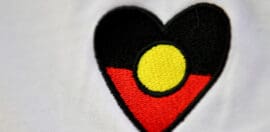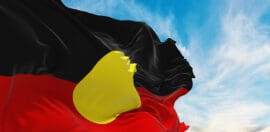‘If you’re not there for the cause, you need to get out of the way’

26 June 2019 at 6:23 pm
When it comes to First Nations justice the progressive movement needs to decide if it wants to be part of the problem or part of the solution, according to Indigenous leaders.
Speaking at Progress 2019 on Thursday, Rod Little, Lara Watson, Larissa Baldwin, Bruce Pascoe, and Ruby Wharton addressed issues of truth telling, the role of First Nations people in organising First Nations communities, how they’re agitating against the status quo, and what comes next.
The conversation pointed the finger at those in the audience to ask where their accountability was to First Nations people.
Wharton, a member of the Warriors of the Aboriginal Resistance who has been an active organiser since the age of 15 and said she was “raised in the grassroots”, said she was constantly asked by her white peers “how do I become involved?”
Her advice was simple.
“You show up. You be quiet. You listen to what is being told. And you offer your resources in whatever capacity you have, because in the end we are all there for the movement,” Wharton said.
There was a note of caution for those who become activists for the label, the accolades or the paycheck.
“If you’re not there for the cause, you need to get out of the way,” she said.
“Because these are people’s livelihoods that we are dealing with. That’s the first and only focus we need to have.”
Her point was reinforced by Little, co-chair of the National Congress of Australia’s First Peoples, who highlighted the multiple failed approaches and “broken promises” of government over the years.
He said he never knew he was poor until some government official told him.
“They say they want to improve our lives. But mostly those approaches have failed, in attempts to do things to us rather than with us,” Little said.
“That’s a message for all in the room today. Work with us. Walk alongside us. Collaborate. When you realise you are a hindrance, step out of the way.”
Pascoe, the author of Dark Emu: Black Seeds, reflected on his journey to discover the truth about Aboriginal history. He stressed the importance of telling the truth and celebrating Australia’s true heritage.
He made the point that when you begin a conversation with a lie, you finish with a lie.
“If you are worried that Aboriginal people have not obtained the health, education, job opportunities of the rest of Australia and you want to close the gap, if you begin that conversation with a lie, when you try and repair the life expectations of Aboriginal people, you are more likely to call in the army, than you are the school teacher or the nurse,” Pascoe said.
He questioned what would happen if we had a better conversation – one that started with the knowledge that when Europeans arrived Aboriginal people were already building houses, building irrigation channels, and growing and harvesting crops.
“I wish I’d been able to have that conversation with my school teachers,” he said.
In concluding the session, Baldwin, First Nations justice lead at GetUp, said we need to start asking First Nations people, how do you win?
“Because we don’t win without power. What builds our power is our advocacy, our ability to tell the truth, our organising that is done by us, campaigning that is led by our communities, with our Aboriginal campaigners at the forefront,” she said.
She said that too often the progressive movement wanted to know what they can do for Aboriginal people and how they can work them into existing programs or campaigns.
She turned the onus back on the people in the room.
“Where [is] your accountability to First Nations people, to our struggle?” she said.
“Because there is no justice without First Nations justice.”







